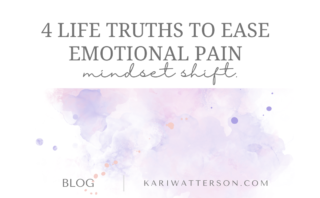When we learn how to manage our minds, we reduce so much of our emotional suffering.
When we put up walls in relationships we want
to spare ourselves the pain of potential rejection,
we actually cause ourselves deeper pain
because we’ll always wonder what might’ve been
had we had the courage to feel our fear
and still show up anyway.
If this quote resonates with you, know I feel you and understand you on the deepest of levels, my friend.
This was me for most of my life. And to be honest, it’s still my default tendency. But once I understood what rejection really was, I was able to start taking small steps to work through my fears so I could stop holding myself back from the relationships I wanted.
Not surprisingly, it all starts with managing our minds.
Fears, including fear of rejection, are simply feelings.
And feelings are created by thoughts.
So if we want to work on our fears, we need to begin by first looking at our thoughts.
Some of you fear rejection in romantic relationships. Others of you fear rejection in friendships. Still others of you fear being rejected by your family or peers.
And for some of you, you fear rejection all around.
Here’s the thing.
People connect and don’t connect all the time.
We only view the lack of connection as a rejection when we:
1. Wanted or hoped for a different outcome; and
2. Believe the other party considered options and specifically chose not to engage with us.
But even then, rejection only becomes intensely painful when:
1. We cling to the expectation or desire for a specific outcome; and
2. We make the lack of connection mean there’s something wrong with us or that we’re inherently lacking.
The elephant in the room about the pain of rejection is that it’s self-generated.
We create our own suffering when we argue with what is (i.e., we want connection but we think or feel the other party doesn’t), and when we hold onto thoughts that only destroy our feelings of self-worth.
This is a telltale sign that we have inner work to do.
Otherwise, we’ll keep repeating the same painful pattern of wanting, assessing our worthiness and coming up lacking, walling ourselves off from potential relationships to avoid pain (i.e., rejecting others before they can reject us), experiencing the pain of rejection anyway (even though it was self-created), all of which deepen our belief that walls are necessary to protect ourselves from the pain of rejection….
What changed for me was when I realized — and truly believed — that the only thing holding me back from meaningful friendships were my thoughts.
I know from mindset work that thoughts are within my control.
I could’ve chosen to think new thoughts — thoughts that would give me courage to reach out to people.
But when you seek out relationships without doing the inner work to uncover why you’re so afraid of them, you may connect with someone but sooner or later your underlying insecurities will surface and your brain will urge you to retreat to the safety of your walls at the first sign of “rejection”.
Been there, done that, so many times. This time around, I knew if I really wanted to learn to have deeper, more meaningful friendships, I had to first start with my relationship with myself.
I know. You probably didn’t want to hear that, did you?
Now, I didn’t have to wait until I could say, “I love myself.” I know this is a hard thing for many of us to say.
But I did need to be able to get to the point where I could embrace my humanness, and treat myself and my efforts with kindness and compassion.
After a lifetime of being my own worst critic, how did I develop self-compassion?
By taking responsibility for the thoughts I let run through my head.
If our fears are created by our thoughts, then we need to be intentional about what we choose to think.
Are we clinging to thoughts that only make us feel worse about ourselves, or are we selecting thoughts that help us see our efforts for the courageous steps they are?
Because doing this relationship work requires us to lean into all the intense feelings we’ve avoided in the past. We will likely feel awkward, embarrassed, panicked, anxious, vulnerable, scared — and that’s okay. If we want to change, we need to welcome all the feelings.
Our brains will try to activate our “flight response” because retreating is what we’ve always done in the past, but when we commit to doing this work, we need to remind ourselves that our brains only sense danger because we’ve never let ourselves go beyond a superficial relationship before.
That’s why self-compassion is so important.
Because when we commit to being kinder and gentler to our human selves, we’re acknowledging in advance that our efforts may be imperfect.
And when we embrace imperfect progress over perfection, we’re more willing to put ourselves out there.
And the more we’re willing to put ourselves out there, open, receptive and fully flawed…
The more we commit to showing up the way we’ve always wanted…
The more we peel back our defensive layers and discover who we truly are…
The more we allow others to feel safe to do the same.
And that’s where the real connection begins.
It may take time, but don’t be in a rush.
Take time to get to know yourself.
And when you start looking at yourself with kinder eyes, you’ll find all the things that make you uniquely you. Your quirks, your neuroses, your humor, your hurts, your softer side…
For the first time in your life, you’ll start to get a sense of who you really are and what’s really important to you.
Don’t get me wrong, years of insecurities won’t magically disappear.
Mindset work is a daily practice.
But the more you lean into your fears and manage the thoughts and feelings that come up when you do, the more resilient you’ll become.
And that resilience will turn into self-trust and a sense of inner peace that will fundamentally shape how you view yourself in future relationships.
This work may feel incredibly scary, my friends, but I’m here to tell you it’s worth it.
And the best part is the only thing you need to change are your thoughts.
Kari
— — — —
Ever wonder if you might benefit from life coaching? Try a free 90-minute coaching call. Experience what it would be like to have weekly 1:1 coaching support for 6 months to a year while you actively do the work to change your life. Mindset + Habits + Identity Work.
Click here to book your free call this week.




